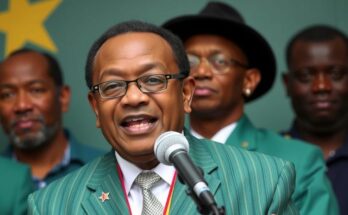Independent experts from the Carter Center have legitimized the opposition’s tally sheets from Venezuela’s presidential election, suggesting President Maduro may have lost. During a session with the Organization of American States, it was revealed that the electronic voting system functioned correctly, although Maduro was declared the winner without detailed results being published. The ongoing dispute highlights significant concerns regarding electoral integrity in Venezuela.
In a significant development concerning Venezuela’s contested presidential election, an independent group of election experts, specifically the Carter Center, has validated the tally sheets presented by the opposition as evidence of President Nicolás Maduro’s potential defeat. This revelation was conveyed during a session held by the Organization of American States (OAS), in response to the ongoing disputes surrounding the election results reported on July 28. The Carter Center, which was among the two independent observers engaged by the Venezuelan government, noted that the electronic voting system operated effectively, corroborating claims made by both the opposition and government representatives regarding the accuracy of the vote. Crucially, the expert, Jennie Lincoln, emphasized that these tally sheets, known as actas, which serve as critical documentation of election outcomes, had been compiled from over 80% of the electronic voting machines deployed during the election. Despite the declaration of victory for Maduro by electoral authorities soon after the polls closed, there was a notable absence of detailed results which typically accompany such announcements. The government attributed this lack of transparency to a purported hacking incident affecting their systems. In contrast, the opposition launched a comprehensive effort to disseminate the tally sheets online, leading to government objections and subsequent investigations against opposition candidates. During her address to diplomatic representatives, Lincoln noted the following: “The voting system is electronic, but it offers a paper trail – proof of what the electronic machine reports.” Although she refrained from outright declaring the opposition’s candidate, Edmundo González, the election victor, she underscored that it’s the electoral authorities’ role to make such proclamations.
The political landscape in Venezuela has been fraught with tension, particularly concerning electoral integrity. The country held a presidential election on July 28, where President Nicolás Maduro’s government asserted a victory amidst widespread allegations of irregularities. The contested nature of the election arose partly from the lack of publicly disclosed detailed results, contrary to established practices in previous elections. The use of electronic voting machines, which generate printed tally sheets, became the focal point of disputes, as opposition groups sought to validate their claims against the government’s assertions. Observations by independent groups such as the Carter Center are pivotal in ascertaining the authenticity of the electoral process and the legitimacy of the results.
The validation of the opposition’s tally sheets by independent election experts serves to highlight the complexities surrounding Venezuela’s recent presidential election. It underscores the importance of transparency and accountability in electoral systems. The ongoing debate regarding the legitimacy of the election results reflects broader concerns about democratic processes in the region.
Original Source: apnews.com




